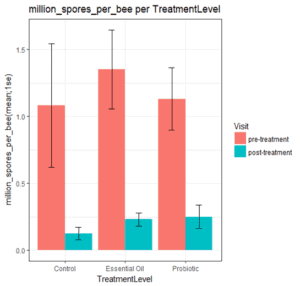With the withdrawal of Fumagillin from the market, there has been renewed interest among queen producers and honey producers alike in finding ways to control Nosema infection in their bees. The Texas BIP team recently helped a beekeeper look at whether essential oil patties or a sprayed-on probiotic would help reduce the Nosema load of spring splits. 30 colonies (8-12 colonies per group) were sampled for Nosema at time of check-back (mid-April 2018) and randomly selected to be part of one of three groups: untreated control, essential oil, or probiotic. When Nosema loads were sampled again (mid-May 2018), the levels had gone down in all groups in accordance with the usual seasonal pattern. However, there was no significant difference seen between the treatments.

It is important to communicate non-conclusive results like these – as an antidote to the hype that often accompanies new products – and because it steers us toward testing the products in a different setting where they may actually work. Our ongoing sampling work with many operations puts us in a great position to collaborate with beekeepers on experiments, and to pursue questions that have immediate application among beekeepers. By donating today, you are enabling us to build on these strengths.